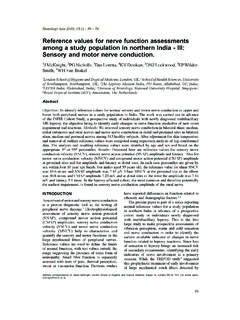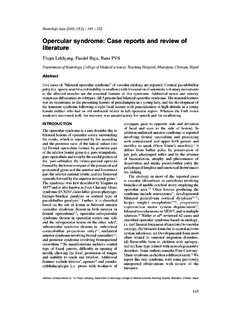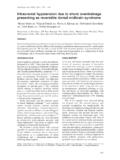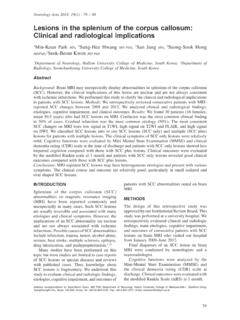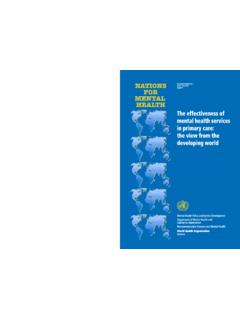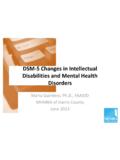Transcription of The psychological and social impact of epilepsy
1 Neurology Asia10 The psychological and social impact of epilepsyMichael D HILLSD epartment of Psychology, University of Waikato, Hamilton, New ZealandAbstract epilepsy has many non-medical effects on the people with epilepsy , their family and community. To ensure that epilepsy is fully controlled requires a specialist neurologist or paediatrician with up-to-date detailed knowledge to diagnose and prescribe treatment, a general practitioner to supervise day-to-day medical management and an epilepsy specialist community worker to provide psychosocial support, information and education to help maintain quality of life. By working together as a team, the specialist, the general practitioner and the epilepsy specialist community worker can ensure that the psychological and social impact of epilepsy is reduced to a epilepsy is a medical condition, the person with epilepsy also has to cope with its psychological and social consequences.
2 This paper discusses how the people with epilepsy can be assisted to cope with those ON THE SELFA person s body is an integral part of their self-percept, or identity. Finding that the brain does not function as others brains do forces a change in body percept and therefore self-percept. The adolescent s question Who am I? recurs, which can be traumatic for an adult. Lower self-esteem can result from perception of the self as less competent than others and self-categorisation as an epileptic and consequent perception of Diagnosis can result in many psychological difficulties. Grief at the realisation of being disabled goes through stages of shock, anxiety, bargaining and denial, mourning and depression, internalised anger, externalised anger, acknowledgement and finally acceptance and Such grief can occur either at onset or on realisation of difference.
3 Reversion is possible at any time. Other emotional states which may recur include anxiety arising from the unpredictability of seizures and feelings of lack of control and helplessness. Guilt can result in affective disorder. Anxiety combined with guilt can grow to become depression. Lowered energy and vitality may result from disrupted sleep patterns, while defensiveness can lead to a need to conceal, anger and epilepsy is a hidden or invisible disability, as no symptoms are apparent except during a seizure. It often has no apparent cause, which results in a fear of the unknown. Consequently it is easier to deny, resulting in poor compliance with treatment and a refusal to alter life-style.
4 Being hidden makes it more difficult for others wishing to interact, and concealment makes it difficult to find other people with epilepsy for support. Being hidden may lead to accusations of hypochondria and misbehaviour as well as erroneous ON THE FAMILYD iagnosis of epilepsy in their child leads to stress in parents, resulting in a higher divorce rate. Focus by parents on the child with epilepsy can result in poor relationships between the child with epilepsy and siblings and psychological difficulties among siblings. Such focus can also affect family cohesion and relations between the family and their community. It can result in the people with epilepsy growing up to make a poor parent ON EDUCATIONA higher prevalence is found in people with epilepsy of learning disabilities and memory problems, often caused by co-morbidities such as brain damage.
5 Attention deficits occur during seizures, especially during absence seizures in school-children. Antiepileptic drug side-effects of drowsiness and short attention span can affect educational achievement, and are commonly exacerbated by ON EMPLOYMENTU nemployment is higher among people with epilepsy , by up to 50% in developed countries if Neurology Asia 2007; 12 (Supplement 1) : 10 1211seizures are not fully controlled and up to 100% in developing countries. This can be caused by employer prejudice resulting from stigma and a lack of information, a belief that machinery should be avoided by the people with epilepsy , inability to drive, or poorer academic achievement. Disclosure to an employer is therefore a difficult decision.
6 Unemployment commonly results in a lower SES, lower self-esteem, lessened well-being and a lower quality of ,8 impact ON social RELATIONSHIIPSS ocial isolation and poor social adaptation can result from perceived stigma or over-dependency caused by parental overprotection. The people with epilepsy also often fears embarrassment by a seizure, causing reluctance to engage in social interaction, with concomitantly low self-esteem and academic under-achievement. These can result in a shrunken support network, fewer friends, a lower likelihood of marriage and greater likelihood of anti- social ON SEXUAL RELATIONSHIPSS atisfactory relations with the other sex require self-esteem. Low self-esteem in a people with epilepsy can result in failure to establish good sexual relationships.
7 Brain damage and/or antiepileptic drugs may also result in anhedonia. Head injury may result in reduced libido and erectile dysfunction. Inadequate sexual functioning may result in depression, marital distress or ,10 impact ON WOMENE pilepsy causes unique problems for women. Seizure frequency and severity can be exacerbated by menstrual hormonal changes. Women with epilepsy often experience anxieties concerning children. Doubts about seizures being triggered by labour, their ability to care for their child, the possibility of inheritance of epilepsy and birth defects are compounded by fears about antiepileptic drug side effects and the mother s ability to be a good role model during ON QUALITY OF LIFEQ uality of life is the degree to which a person s cognitive, emotional, social and spiritual experience of life is positive.
8 Quality of life for a people with epilepsy can be reduced by higher physical morbidity rates, seizure-related accidents, antiepileptic drug side effects, more social withdrawal, increased social isolation, poorer sexual relationships, and lower marriage rates. Quality of life for the people with epilepsy may also be reduced by higher psychological morbidity rates, anxiety and depression, lower self-esteem, increased helplessness, defensive aggressiveness, poorer educational achievement and higher unemployment or cope with epilepsy , the people with epilepsy needs information and psychological and social support. The physician can supply some of each, but not as much as is needed, nor for the weeks, months and years over which they are needed.
9 The physician should therefore refer a people with epilepsy to an epilepsy specialist nurse, a psychologist a psychiatrist or an epilepsy specialist community worker. The epilepsy specialist community worker can provide support, be an informed, empathetic listener, alleviate fear of the unknown, encourage compliance, and provide information to the people with epilepsy , their family and the community. The epilepsy specialist community worker can also facilitate the establishment of contacts and self-help groups to boost self-esteem and confidence. Moreover the epilepsy specialist community worker can provide information about epilepsy , available drugs, alternative approaches to control, the local medical scene, benefits and other available assistance and employment.
10 The epilepsy specialist community worker can also help the people with epilepsy in thinking about whether or not to disclose, local regulations for driving, insurance, and in contacting other people with epilepsy . They can advocate, assist the people with epilepsy to communicate with the clinician and train the patient in reporting seizure activity and drug efficacy and side effects. The epilepsy specialist community worker can follow up clinical advice to ensure compliance and assist in communicating with employers, officials and others having power in the life of the people with epilepsy , such as members of the ,14 REFERENCES 1. Wright BA. Physical disability - a psychosocial approach.

